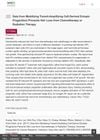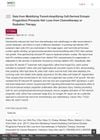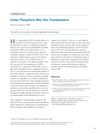 70 citations,
January 2000 in “Drug Development Research”
70 citations,
January 2000 in “Drug Development Research” New butyric acid prodrugs show promise for cancer treatment, anemia management, and protecting hair from chemotherapy damage.
 26 citations,
November 2016 in “European Journal of Clinical Pharmacology”
26 citations,
November 2016 in “European Journal of Clinical Pharmacology” Valproic acid helps delay hair loss and increases survival time for high-grade glioma patients undergoing radiation therapy.
[object Object] 8 citations,
September 2015 in “Radiotherapy and oncology” Scalp cooling does not stop hair loss from radiotherapy.
 12 citations,
October 2017 in “Radiation Research”
12 citations,
October 2017 in “Radiation Research” mTORC1 signaling needed for quick hair follicle recovery after radiation damage.
 61 citations,
January 2013 in “Indian Journal of Dermatology, Venereology and Leprology”
61 citations,
January 2013 in “Indian Journal of Dermatology, Venereology and Leprology” Hair usually grows back 1-3 months after treatment for anagen effluvium, and children with Loose Anagen Hair Syndrome often improve by adolescence.
 1 citations,
July 2020 in “International journal of radiology & radiation therapy”
1 citations,
July 2020 in “International journal of radiology & radiation therapy” Partial hair-sparing brain radiotherapy is possible and doesn't affect cancer control but still causes noticeable hair loss.
 April 2023 in “The journal of investigative dermatology/Journal of investigative dermatology”
April 2023 in “The journal of investigative dermatology/Journal of investigative dermatology” Prostaglandin E2 helps prevent hair loss from radiotherapy by protecting hair growth cells and aiding self-repair.
 14 citations,
January 2013 in “Journal of Cutaneous Medicine and Surgery”
14 citations,
January 2013 in “Journal of Cutaneous Medicine and Surgery” Some cancer treatments can cause permanent hair loss.
1 citations,
March 2024 in “International journal of molecular sciences” Radiation therapy damages skin structure and immune function, causing inflammation and potential hair loss.
 2 citations,
September 2020 in “International journal of radiology & radiation therapy”
2 citations,
September 2020 in “International journal of radiology & radiation therapy” Radiotherapy can cause rare changes in hair color, which should be discussed with patients.
 1 citations,
January 2021 in “Journal of Cancer Therapy”
1 citations,
January 2021 in “Journal of Cancer Therapy” Regenerative medicine may help reduce radiotherapy side effects like skin cancer, fibrosis, pain, and hair loss.
 3 citations,
June 2023 in “The journal of investigative dermatology/Journal of investigative dermatology”
3 citations,
June 2023 in “The journal of investigative dermatology/Journal of investigative dermatology” The conclusion suggests that focusing on certain cellular pathways may improve the prevention and repair of hair loss caused by radiotherapy.
 2 citations,
October 2016
2 citations,
October 2016 Chemotherapy and radiotherapy can cause skin side effects like rashes, hair loss, and nail changes, which are usually managed with conservative treatments.
Boosting certain cell signals can prevent hair loss from chemotherapy and radiation.
[object Object] Boosting certain cell signals can prevent hair loss from chemotherapy and radiation.
 October 2014 in “Cancer Research”
October 2014 in “Cancer Research” A new topical treatment may prevent hair loss from cancer therapy by adjusting cell death processes in hair follicles.

Activating certain cells in hair follicles can prevent hair loss caused by cancer treatments.
 131 citations,
October 2004 in “Clinical Cancer Research”
131 citations,
October 2004 in “Clinical Cancer Research” Tempol is safe and may prevent hair loss from brain radiotherapy.

Activating certain hair follicle cells could prevent hair loss from cancer treatments.
 7 citations,
October 2019 in “Klinická onkologie”
7 citations,
October 2019 in “Klinická onkologie” Cancer treatments often cause hair loss and damage, affecting patients' mental health.
 17 citations,
January 2010 in “International journal of trichology”
17 citations,
January 2010 in “International journal of trichology” A man experienced hair loss from radiotherapy, which can be temporary or permanent depending on radiation dose, with potential treatments available.
 13 citations,
March 2011 in “British Journal of Dermatology”
13 citations,
March 2011 in “British Journal of Dermatology” A woman with scalp lymphoma and hair loss improved with radiotherapy, highlighting the need for biopsies in similar cases.
1 citations,
September 2014 in “Neuro-Oncology” Shiunko ointment may help prevent scalp dermatitis during radiotherapy but doesn't stop hair loss.
 September 2021 in “PubMed”
September 2021 in “PubMed” Hair transplantation is effective for treating scar-related hair loss on the head and neck.
 July 2021 in “World journal of plastic surgery”
July 2021 in “World journal of plastic surgery” Hair transplantation is effective for treating scar-related hair loss on the head and neck.
 18 citations,
January 2019 in “Experimental Dermatology”
18 citations,
January 2019 in “Experimental Dermatology” Certain cells outside the hair follicle's bulge area can quickly regenerate damaged hair follicles, potentially helping to reduce hair loss from cancer treatments.
 1 citations,
December 2012 in “Dermatologic Surgery”
1 citations,
December 2012 in “Dermatologic Surgery” Hair transplants can risk reactivating lichen planopilaris, a scarring hair loss condition.
 11 citations,
August 2003 in “Plastic and Reconstructive Surgery”
11 citations,
August 2003 in “Plastic and Reconstructive Surgery” Hair restoration in children, tailored to their specific needs, can yield good aesthetic results with minimal complications.
 March 2014 in “Journal of The American Academy of Dermatology”
March 2014 in “Journal of The American Academy of Dermatology” A botanical extract may help manage hair loss from chemotherapy by preventing cell death in hair follicles.
 19 citations,
October 2008 in “Journal der Deutschen Dermatologischen Gesellschaft”
19 citations,
October 2008 in “Journal der Deutschen Dermatologischen Gesellschaft” Anti-cancer treatments can cause reversible hair loss, skin sensitivity, pigmentation changes, nail damage, and skin reactions, with a need for more research on managing these side effects.

























